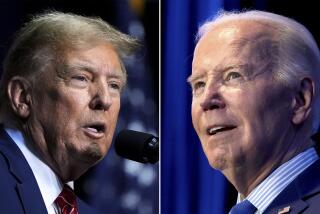Republicans poised for midterm gains, polling indicates
Six months out from the November midterm election, Republicans have a strong advantage which, if it holds up, would likely translate into significant gains in Congress, a new nationwide survey indicates.
The latest Pew Research Center poll shows that 47% of registered voters say they plan to vote for a Republican candidate or lean that direction compared with 43% who say they support or lean toward the Democrats.
Republicans have a particularly strong lead with groups of voters who tend to turn out in midterm elections, according to the poll, which was done for USA Today. Men 50 and older, for example, lean toward the GOP, 55% to 37%.
Republicans also have a 50%-39% lead among voters in the South, where several of the most hotly contested U.S. Senate races are taking place this year. They have a narrower lead in the Midwest, while Democrats have a small lead in the Northeast and West.
Much can change in six months, of course. Half a year ago, Republicans were struggling with a public backlash against the government shutdown, and Democrats had a healthy lead on the question of which party voters favored.
That question, known as a generic ballot, has a mixed record as a forecasting tool. In 2006, Democrats had a 10-point generic ballot lead in the spring and went on to make major gains. In 2010, the parties were roughly even on the generic ballot and Republicans won a big victory.
Other questions that probe voter motivations, which may provide better indicators, also point toward GOP gains this year. Just over half the voters in Pew’s poll, for example, said that when deciding whom to vote for, one factor would be which party they want to control Congress. Much as in 2010, Republican voters were considerably more likely than Democratic supporters to say that partisan control of Congress mattered to them. In 2006, the opposite was true.
Similarly, 43% of voters say they view their midterm ballot at least partially as a vote for or against President Obama. Six in 10 of the voters in that group say they view the ballot as a chance to vote against Obama, with 4 in 10 saying theirs would be a vote for the president.
Opposition to Obama’s healthcare law remains a strong motivating factor for Republicans. Major news events regarding the law have marked the last year – including the bungled rollout of the HealthCare.gov website in the fall and the successful enrollment of some 8 million Americans in coverage this spring. But voter attitudes about Obamacare haven’t changed.
The current division, 55% disapproving and 41% approving, is almost identical to the one last September, before the law’s rollout.
One reason that actual experience with the law hasn’t changed more views is that broad political philosophy rather than people’s personal situations appears to undergird both opposition and support.
Among those who oppose the law, 42% said their most important reason is that it represents “too much government involvement in healthcare.” Only 14% cited the law’s requirement that all people obtain health coverage, the so-called individual mandate. An even smaller group, 12%, said their main reason was fear that their own healthcare would suffer.
Supporters of the law offered similarly broad factors behind their position, giving as their chief reasons the expansion of coverage to the uninsured (39%) or the assurance that people could not be denied coverage because of a preexisting medical problem (35%). Only 6% cited a possible improvement in their own health coverage.
Despite disapproval of the law, Americans were more likely to say they have confidence in Obama and Democratic leaders to handle healthcare policy correctly than they have in Republican leaders.
And regardless of their positions, just 4 in 10 said the law’s major provisions would “probably be eliminated.” About half of those surveyed said they believed the law’s major provisions were “probably here to stay.”
More to Read
Start your day right
Sign up for Essential California for news, features and recommendations from the L.A. Times and beyond in your inbox six days a week.
You may occasionally receive promotional content from the Los Angeles Times.







